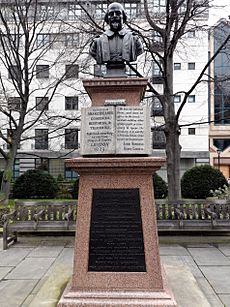John Heminges facts for kids
John Heminges (born in 1556, died in 1630) was an important actor in William Shakespeare's acting group, the King's Men. He was also a key person behind the scenes. Along with Henry Condell, he helped put together the First Folio. This was the first collection of Shakespeare's plays, published in 1623. Heminges also managed the money for the King's Men.
Contents
Who Was John Heminges?
Early Life and Family
John Heminges was born in Droitwich Spa, Worcestershire, England. He was baptized on November 25, 1556. When he was twelve, he moved to London. There, he became an apprentice to a grocer named John Collins for nine years. This meant he learned the trade. In 1587, he became a "freeman" of the Grocers' Company. This allowed him to work independently.
In 1588, he married Rebecca Knell. She was the widow of an actor named William Knell. John and Rebecca settled in the St Mary Aldermanbury area of London. They had at least thirteen children together between 1590 and 1613.
Joining the King's Men
Heminges started working in theatre around 1593. He first joined a group called Lord Strange's Men with his friend Augustine Phillips. By the next year, they both joined the Lord Chamberlain's Men. This group later became the famous King's Men. Heminges stayed with this company for his entire career, until he died. Records from 1630 show he received money to help the company during a time of plague.
Beyond Acting: Business and Trust
Even though he was an actor, Heminges also stayed active in the Grocers' Company. Sometimes, his two worlds mixed. In 1608, he became one of the ten "seacoal-meters" for London. These people measured the coal brought into the city by sea. He later hired John Jackson as his helper.
Both Heminges and Jackson helped William Shakespeare in 1613. They acted as trustees when Shakespeare bought a house called the Blackfriars Gatehouse. Between 1595 and 1628, Heminges also took on ten apprentices through the Grocers' Company. Eight of these apprentices later performed in Heminges's acting company. One famous apprentice was Alexander Cooke. Heminges also built and ran a pub at the Globe Theatre.
Protecting Shakespeare's Plays
Shakespeare mentioned Heminges in his will. He left money to Heminges, Richard Burbage, and Henry Condell to buy special rings. Burbage died before Shakespeare's First Folio was published. But Heminges and Condell became the main editors of this important book.
In their introduction, they wrote that they wished Shakespeare had lived to publish his own works. They also shared how much care they took to gather and publish his plays. Their hard work was very important. It helped save many of Shakespeare's plays that might have been lost forever.
Legal Challenges and Legacy
Heminges was a "sharer" in the Globe Theatre. This meant he owned a part of it. His name appears in many legal papers found by researcher Charles William Wallace. The Globe Theatre often faced lawsuits. This was because shares were sometimes left to people who didn't care about the company's future.
In one lawsuit, Heminges v Ostler, Heminges was sued by his own daughter, Thomasina Ostler. She wanted a share of the company. We don't know the final result of this lawsuit. When Heminges died, his shares in the Globe and Blackfriars theatres went to his son, William Heminges. These old lawsuit records are very helpful for historians. They give detailed information about how the theatre company ran.
His Final Years
John Heminges died in October 1630 in Southwark. He was buried on October 12, 1630, at St Mary Aldermanbury church. In his will, he asked to be buried as close to his wife as possible.
What Did John Heminges Do?
Acting Roles
We don't know exactly how much John Heminges acted. We do know he performed in plays by Ben Jonson. These included Sejanus and Every Man in His Humour. In both plays, he acted alongside Shakespeare. A note from 1616 says he played the role of Corbaccio in Volpone. This suggests he kept acting, even into his fifties.
Some people have said he played the role of Falstaff. However, there isn't much proof for this. An actor once told Alexander Pope that Heminges was a tragedian, meaning he acted in serious plays. But again, there is little evidence to support this claim.
Managing the Company
We know more about Heminges's work as a manager. Court documents often list Heminges as the person who received money for the King's Men. Records from Henry Herbert show that Heminges was often the contact person between the company and the Master of the Revels. The Master of the Revels was a government official who controlled plays and performances.
Heminges also owned a building next to the Globe Theatre. This building might have been used as a pub. He also served as a trustee for Shakespeare. This happened when Shakespeare bought a house in Blackfriars in 1613.
The First Folio: A Huge Gift
Heminges's most important contribution was helping to create the First Folio. This book was published in 1623, seven years after Shakespeare died. It collected 36 of Shakespeare's plays. Without the First Folio, many of these plays might have been lost forever. Heminges and Henry Condell worked hard to gather the scripts. They made sure Shakespeare's amazing stories and characters would live on for future generations.
 | Audre Lorde |
 | John Berry Meachum |
 | Ferdinand Lee Barnett |


